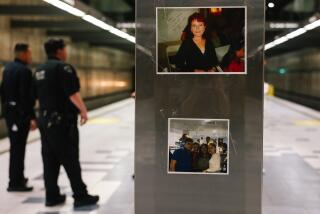Is China putting development ahead of safety?
- Share via
Reporting from Beijing — China’s flashy new airports, rail lines and highways are often cited as symbols of the country’s inexorable rise. But a pair of violent rail incidents are changing that narrative as more Chinese question the value of economic development that some say is coming at the expense of safety.
About 270 people were injured Tuesday when two subway trains collided in Shanghai, paralyzing parts of the country’s financial capital. The accident came just two months after 40 people were killed when two high-speed trains collided on a viaduct in a rural section of the southeastern city of Wenzhou.
Dubbed “blood-stained GDP” by some, the race to ramp up infrastructure at all costs is now exposing vulnerabilities in China’s economic might.
“China should be more cautious and concentrated in avoiding risks,” read an editorial Wednesday in the Global Times, a Communist Party mouthpiece. “Although this is hard to do, the tragedies in Wenzhou and Shanghai keep reminding people that China cannot afford failure.”
The Wenzhou disaster sparked widespread outrage at rail officials who appeared to bungle rescue efforts, then rushed to get the route back in service. At least one train passenger showed his disgust by wearing a helmet on the newly reopened line.
The incident in Shanghai, which boasts the world’s longest subway system, has again prompted public outrage.
A blogger named Qi Jie on Sina Weibo, a popular Twitter-like service, suggested tying officials to the first car of every subway train to ensure that safety standards improved.
China’s central government responded to the Wenzhou collision by slowing down trains, sacking officials and scaling back investment in high-speed rail.
What will happen to China’s ambitious subway plans remains to be seen. The country will soon have underground networks in about three dozen cities, a boon to foreign suppliers such as IBM Corp., Siemens and Alstom, a French conglomerate whose Chinese joint venture has been linked to the Shanghai and Wenzhou incidents.
Between 2010 and 2015, China plans to invest $180 billion in subway lines, tripling the network’s reach to 1,864 miles.
It’s an investment the country needs to get right, as China is now the world’s biggest buyer of cars and congestion is taking an economic toll. An IBM survey released last year found that Beijing and Mexico City have the worst commutes in the world.
The World Resources Institute has emphasized the need for sound transportation policy given the affect rising car ownership has on pollution and China’s oil security.
“Careful planning is a must before a city begins to construct its subway system. Otherwise, it’ll be a regret that can last over 100 years,” Shi Zhongheng of the Urban Rail Transit Research Center at Beijing Jiaotong University told the China Youth Daily newspaper.
More to Read
Inside the business of entertainment
The Wide Shot brings you news, analysis and insights on everything from streaming wars to production — and what it all means for the future.
You may occasionally receive promotional content from the Los Angeles Times.











